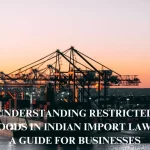Starting an export business opens exciting opportunities. But it also comes with many challenges.
The export process involves compliance with complex regulations. International logistics management and compliance with trade laws for first-time exporters, these challenges can lead to errors that affect profits and relationships with global buyers.
Common problems that new exporters face:
- Lack of knowledge about foreign markets
- Confusion about export regulations and documents
- Challenges in competitive product prices
- Transportation and logistics issues, such as delays or damaged products
- Poor communication with overseas buyers
In this blog, we’ll discuss these common mistakes and offer practical solutions to help you avoid them.
Common Mistakes New Exporters Make
Failure to Conduct Market Research
Skipping target market research can result in poor sales. It’s important to know what your customers want and how to buy.
Ignoring rules and regulations
Each country has its own business rules. Missing documents, licenses, or fees can delay shipments and cost you money.
Incorrect Settings
Incorrect pricing should be lowered or higher. It can hurt your business. Many people need to remember to include shipping costs and currency conversion.
Poorly Delivered Projects
Choosing the wrong shipping method or incorrectly labelling the package may result in product damage or delays.
Forget Insurance
If you don’t have insurance, you may lose money if your package is damaged, damaged or stolen.
Bad Marketing
If your marketing doesn’t match the culture of your target country, you will not be able to attract customers.
Miscommunication
Not connecting with buyers or understanding cultural differences can destroy relationships.
How to Avoid These Mistakes
Do your homework: Research your target market. Understand customer needs and buying trends.
Follow the rules: Learn about export laws and get the right licenses and paperwork in place.
Price wisely: Calculate all costs, including shipping and currency fluctuations, before setting your prices.
Plan your shipping: Use reliable shipping companies and ensure your packages are labeled and protected.
Get insurance: Invest in insurance to cover potential losses during shipping.
Focus on marketing: Adapt your branding and marketing to suit the culture of your target audience.
Stay connected: Communicate clearly with your buyers and respect cultural differences.
Conclusion
Exporting is a great way to expand your business. But it requires careful planning. Curated Exim is here to help you avoid pitfalls and succeed in the global marketplace. Contact us today to get started!




